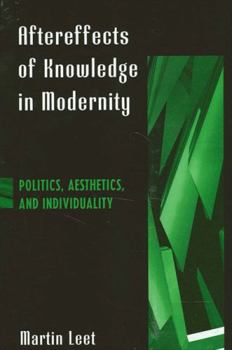Aftereffects of Knowledge in Modernity: Politics, Aesthetics, and Individuality
Examines the relations among knowledge, politics, aesthetics, and individuality.
The relentless accumulation of knowledge is a defining feature of modern life, but what if this feature begins to breed more confusion than enlightenment? Martin Leet examines how the often ambiguous and sometimes destabilizing aftereffects of knowledge have prompted a renewed interest in aesthetics and individuality in parts of contemporary political theory. He contends that this renewal is necessary and desirable, making his case through a multi-faceted critique of Jurgen Habermas. He also engages a wide range of thinkers and traditions, including Nietzsche, Emerson, Weber, the ancient Greeks, and the more recent contributions of Judith Butler, William Connolly, and George Kateb. By focusing on debates about democracy and citizenship, Leet develops a distinctive understanding of the relations between politics, aesthetics, and individuality.
Related Subjects
Philosophy Political Science Politics & Social Sciences Social Science Social Sciences




